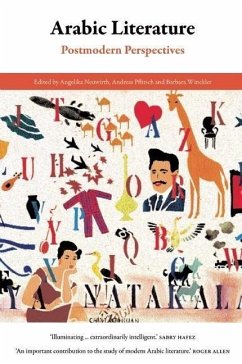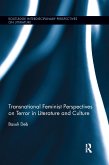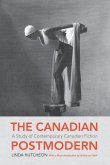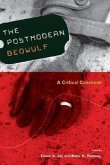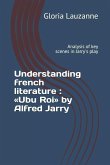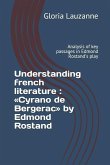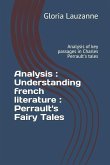Arabic Literature: Postmodern Perspectives
Herausgeber: Neuwirth, Angelika; Winckler, Barbara; Pflitsch, Andreas
Arabic Literature: Postmodern Perspectives
Herausgeber: Neuwirth, Angelika; Winckler, Barbara; Pflitsch, Andreas
- Broschiertes Buch
- Merkliste
- Auf die Merkliste
- Bewerten Bewerten
- Teilen
- Produkt teilen
- Produkterinnerung
- Produkterinnerung
A highly readable collection that maintains that Arabic literature reflects the Western postmodern condition without denying its own traditions.
Andere Kunden interessierten sich auch für
![Transnational Feminist Perspectives on Terror in Literature and Culture Transnational Feminist Perspectives on Terror in Literature and Culture]() Basuli DebTransnational Feminist Perspectives on Terror in Literature and Culture62,99 €
Basuli DebTransnational Feminist Perspectives on Terror in Literature and Culture62,99 €![The Canadian Postmodern The Canadian Postmodern]() The Canadian Postmodern31,99 €
The Canadian Postmodern31,99 €![Postmodern Beowulf Postmodern Beowulf]() Postmodern Beowulf41,99 €
Postmodern Beowulf41,99 €![Apocalypse and After: Modern Strategy and Postmodern Tactics in Pound, Williams, and Zukofsky Apocalypse and After: Modern Strategy and Postmodern Tactics in Pound, Williams, and Zukofsky]() Bruce ComensApocalypse and After: Modern Strategy and Postmodern Tactics in Pound, Williams, and Zukofsky29,99 €
Bruce ComensApocalypse and After: Modern Strategy and Postmodern Tactics in Pound, Williams, and Zukofsky29,99 €![Understanding french literature: Ubu Roi by Alfred Jarry: Analysis of key scenes in Jarry's play Understanding french literature: Ubu Roi by Alfred Jarry: Analysis of key scenes in Jarry's play]() Gloria LauzanneUnderstanding french literature: Ubu Roi by Alfred Jarry: Analysis of key scenes in Jarry's play11,99 €
Gloria LauzanneUnderstanding french literature: Ubu Roi by Alfred Jarry: Analysis of key scenes in Jarry's play11,99 €![Understanding french literature: Cyrano de Bergerac by Edmond Rostand: Analysis of key passages in Edmond Rostand's play Understanding french literature: Cyrano de Bergerac by Edmond Rostand: Analysis of key passages in Edmond Rostand's play]() Gloria LauzanneUnderstanding french literature: Cyrano de Bergerac by Edmond Rostand: Analysis of key passages in Edmond Rostand's play11,99 €
Gloria LauzanneUnderstanding french literature: Cyrano de Bergerac by Edmond Rostand: Analysis of key passages in Edmond Rostand's play11,99 €![Analysis: Understanding french literature: Perrault's Fairy Tales: Analysis of key passages in Charles Perrault's tales Analysis: Understanding french literature: Perrault's Fairy Tales: Analysis of key passages in Charles Perrault's tales]() Gloria LauzanneAnalysis: Understanding french literature: Perrault's Fairy Tales: Analysis of key passages in Charles Perrault's tales11,99 €
Gloria LauzanneAnalysis: Understanding french literature: Perrault's Fairy Tales: Analysis of key passages in Charles Perrault's tales11,99 €-
-
-
A highly readable collection that maintains that Arabic literature reflects the Western postmodern condition without denying its own traditions.
Hinweis: Dieser Artikel kann nur an eine deutsche Lieferadresse ausgeliefert werden.
Hinweis: Dieser Artikel kann nur an eine deutsche Lieferadresse ausgeliefert werden.
Produktdetails
- Produktdetails
- Verlag: Saqi Books
- Seitenzahl: 496
- Erscheinungstermin: 21. September 2010
- Englisch
- Abmessung: 233mm x 154mm x 45mm
- Gewicht: 650g
- ISBN-13: 9780863566943
- ISBN-10: 0863566944
- Artikelnr.: 28403833
- Herstellerkennzeichnung
- Libri GmbH
- Europaallee 1
- 36244 Bad Hersfeld
- gpsr@libri.de
- Verlag: Saqi Books
- Seitenzahl: 496
- Erscheinungstermin: 21. September 2010
- Englisch
- Abmessung: 233mm x 154mm x 45mm
- Gewicht: 650g
- ISBN-13: 9780863566943
- ISBN-10: 0863566944
- Artikelnr.: 28403833
- Herstellerkennzeichnung
- Libri GmbH
- Europaallee 1
- 36244 Bad Hersfeld
- gpsr@libri.de
Angelika Neuwirth: Angelika Neuwirth is Chair of Arabic Studies at the Free University of Berlin and co-director of the Center for Literary and Cultural Studies in Berlin. Andreas Pflitsch: Andreas Pflitsch is a Research Fellow at the Center for Literary and Cultural Studies in Berlin and teaches Arabic Studies at the University of Bamberg and the Free University of Berlin. Barbara Winckler: Barbara Winckler is a Research Fellow at the Center for Literary and Cultural Studies in Berlin and teaches Modern Arabic Literature at the Free University of Berlin.
Contents
preface 9
introduction
Postmodernism 13
Facets of a Figure of Thought
Ines Kappert
The End of Illusions 25
On Arab Postmodernism
Andreas Pflitsch
part one: memory
Introduction 41
Angelika Neuwirth
The Divinity of the Profane 65
Representations of the Divine in the Poetry of Adonis
Stefan Weidner
Days of Amber, City of Saffron 76
Edwar al-Kharrat Remembers and Writes an Unintended Autobiography
Andreas Pflitsch
On the Necessity of Writing the Present 87
Elias Khoury and the "Birth of the Novel" in Lebanon
Sonja Mejcher-Atassi
Historical Memory in Times of Decline 97
Saadallah Wannous and Rereading History
Friederike Pannewick
Linguistic Temptations and Erotic Unveilings 110
Rashid al-Daif on Language, Love, War, and Martyrdom
Angelika Neuwirth
Memories for the Future: Abdelrahman Munif 134
Susanne Enderwitz
Authenticity as Counter-Strategy: Fighting Sadat's "Open Door" Politics 146
Gamal al-Ghitani and The Epistle of Insights into the Destinies
Stephan Guth
"This reality is deplorable" 158
The Egypt of Sonallah Ibrahim: Between Media Representation and
Experienced Everyday Reality
Andrea Haist
Hebrew Bible and Arabic Poetry 171
Reclaiming Palestine as a Homeland Made of Words: Mahmoud Darwish
Angelika Neuwirth
Traditions and Counter-Traditions in the Land of the Bible 197
Emile Habibi's De-Mythologizing of History
Angelika Neuwirth
The Poet of the Arabic Short Story: Zakariyya Tamir 220
Ulrike Stehli-Werbeck
part two: polygamy of place
Introduction 233
Andreas Pflitsch
"From the Orient to the Occident it is just a reflection" 243
The Mirror-Worlds of Habib Tengour
Regina Keil-Sagawe
"I dream in no man's land": Anton Shammas 259
Christian Szyska
Exile at Home 272
Samir Naqqash - Prophecy as Poetics
Osman Hajjar
Reading the Ruins 287
Repressed Memory and Multiple Identity in the Work of Sélim Nassib
Christian Junge
British-Lebanese Identity Fallacies 302
Tony Hanania and a Malady Called Homesickness
Andreas Pflitsch
The Forbidden Paradise 311
How Etel Adnan Learnt to Paint in Arabic
Sonja Mejcher-Atassi
"So we are called Lebanese" 321
Rabih Alameddine on the Unbearable Lightness of Being
Nowhere at Home
Andreas Pflitsch
The Desert as Homeland and Metaphor 331
Reflections on the Novels of the Tuareg Writer Ibrahim al-Koni
Hartmut Fähndrich
A Surrealist Trip to Paradise and Back 342
The Iraqi Author Abdalqadir al-Janabi
Sibylla Krainick
part three: gender transgressions
Introduction 361
Barbara Winckler
Changing the Sexes between Utopia and Heterotopia 369
Tahar Ben Jelloun's The Sand Child and The Sacred Night
Roland Spiller
Androgyny as Metaphor 382
Hoda Barakat and The Stone of Laughter
Barbara Winckler
Transgression as Program 397
On the Novels of Rachid Boudjedra
Doris Ruhe
An Egyptian Don Quixote? 410
Salah Abd al-Sabur's Rethinking of the Majnun-Layla Paradigm
Angelika Neuwirth
On Writing in the "Language of the Enemy" 429
Assia Djebar and the Buried Voices of Algerian History
Barbara Winckler
preface 9
introduction
Postmodernism 13
Facets of a Figure of Thought
Ines Kappert
The End of Illusions 25
On Arab Postmodernism
Andreas Pflitsch
part one: memory
Introduction 41
Angelika Neuwirth
The Divinity of the Profane 65
Representations of the Divine in the Poetry of Adonis
Stefan Weidner
Days of Amber, City of Saffron 76
Edwar al-Kharrat Remembers and Writes an Unintended Autobiography
Andreas Pflitsch
On the Necessity of Writing the Present 87
Elias Khoury and the "Birth of the Novel" in Lebanon
Sonja Mejcher-Atassi
Historical Memory in Times of Decline 97
Saadallah Wannous and Rereading History
Friederike Pannewick
Linguistic Temptations and Erotic Unveilings 110
Rashid al-Daif on Language, Love, War, and Martyrdom
Angelika Neuwirth
Memories for the Future: Abdelrahman Munif 134
Susanne Enderwitz
Authenticity as Counter-Strategy: Fighting Sadat's "Open Door" Politics 146
Gamal al-Ghitani and The Epistle of Insights into the Destinies
Stephan Guth
"This reality is deplorable" 158
The Egypt of Sonallah Ibrahim: Between Media Representation and
Experienced Everyday Reality
Andrea Haist
Hebrew Bible and Arabic Poetry 171
Reclaiming Palestine as a Homeland Made of Words: Mahmoud Darwish
Angelika Neuwirth
Traditions and Counter-Traditions in the Land of the Bible 197
Emile Habibi's De-Mythologizing of History
Angelika Neuwirth
The Poet of the Arabic Short Story: Zakariyya Tamir 220
Ulrike Stehli-Werbeck
part two: polygamy of place
Introduction 233
Andreas Pflitsch
"From the Orient to the Occident it is just a reflection" 243
The Mirror-Worlds of Habib Tengour
Regina Keil-Sagawe
"I dream in no man's land": Anton Shammas 259
Christian Szyska
Exile at Home 272
Samir Naqqash - Prophecy as Poetics
Osman Hajjar
Reading the Ruins 287
Repressed Memory and Multiple Identity in the Work of Sélim Nassib
Christian Junge
British-Lebanese Identity Fallacies 302
Tony Hanania and a Malady Called Homesickness
Andreas Pflitsch
The Forbidden Paradise 311
How Etel Adnan Learnt to Paint in Arabic
Sonja Mejcher-Atassi
"So we are called Lebanese" 321
Rabih Alameddine on the Unbearable Lightness of Being
Nowhere at Home
Andreas Pflitsch
The Desert as Homeland and Metaphor 331
Reflections on the Novels of the Tuareg Writer Ibrahim al-Koni
Hartmut Fähndrich
A Surrealist Trip to Paradise and Back 342
The Iraqi Author Abdalqadir al-Janabi
Sibylla Krainick
part three: gender transgressions
Introduction 361
Barbara Winckler
Changing the Sexes between Utopia and Heterotopia 369
Tahar Ben Jelloun's The Sand Child and The Sacred Night
Roland Spiller
Androgyny as Metaphor 382
Hoda Barakat and The Stone of Laughter
Barbara Winckler
Transgression as Program 397
On the Novels of Rachid Boudjedra
Doris Ruhe
An Egyptian Don Quixote? 410
Salah Abd al-Sabur's Rethinking of the Majnun-Layla Paradigm
Angelika Neuwirth
On Writing in the "Language of the Enemy" 429
Assia Djebar and the Buried Voices of Algerian History
Barbara Winckler
Contents
preface 9
introduction
Postmodernism 13
Facets of a Figure of Thought
Ines Kappert
The End of Illusions 25
On Arab Postmodernism
Andreas Pflitsch
part one: memory
Introduction 41
Angelika Neuwirth
The Divinity of the Profane 65
Representations of the Divine in the Poetry of Adonis
Stefan Weidner
Days of Amber, City of Saffron 76
Edwar al-Kharrat Remembers and Writes an Unintended Autobiography
Andreas Pflitsch
On the Necessity of Writing the Present 87
Elias Khoury and the "Birth of the Novel" in Lebanon
Sonja Mejcher-Atassi
Historical Memory in Times of Decline 97
Saadallah Wannous and Rereading History
Friederike Pannewick
Linguistic Temptations and Erotic Unveilings 110
Rashid al-Daif on Language, Love, War, and Martyrdom
Angelika Neuwirth
Memories for the Future: Abdelrahman Munif 134
Susanne Enderwitz
Authenticity as Counter-Strategy: Fighting Sadat's "Open Door" Politics 146
Gamal al-Ghitani and The Epistle of Insights into the Destinies
Stephan Guth
"This reality is deplorable" 158
The Egypt of Sonallah Ibrahim: Between Media Representation and
Experienced Everyday Reality
Andrea Haist
Hebrew Bible and Arabic Poetry 171
Reclaiming Palestine as a Homeland Made of Words: Mahmoud Darwish
Angelika Neuwirth
Traditions and Counter-Traditions in the Land of the Bible 197
Emile Habibi's De-Mythologizing of History
Angelika Neuwirth
The Poet of the Arabic Short Story: Zakariyya Tamir 220
Ulrike Stehli-Werbeck
part two: polygamy of place
Introduction 233
Andreas Pflitsch
"From the Orient to the Occident it is just a reflection" 243
The Mirror-Worlds of Habib Tengour
Regina Keil-Sagawe
"I dream in no man's land": Anton Shammas 259
Christian Szyska
Exile at Home 272
Samir Naqqash - Prophecy as Poetics
Osman Hajjar
Reading the Ruins 287
Repressed Memory and Multiple Identity in the Work of Sélim Nassib
Christian Junge
British-Lebanese Identity Fallacies 302
Tony Hanania and a Malady Called Homesickness
Andreas Pflitsch
The Forbidden Paradise 311
How Etel Adnan Learnt to Paint in Arabic
Sonja Mejcher-Atassi
"So we are called Lebanese" 321
Rabih Alameddine on the Unbearable Lightness of Being
Nowhere at Home
Andreas Pflitsch
The Desert as Homeland and Metaphor 331
Reflections on the Novels of the Tuareg Writer Ibrahim al-Koni
Hartmut Fähndrich
A Surrealist Trip to Paradise and Back 342
The Iraqi Author Abdalqadir al-Janabi
Sibylla Krainick
part three: gender transgressions
Introduction 361
Barbara Winckler
Changing the Sexes between Utopia and Heterotopia 369
Tahar Ben Jelloun's The Sand Child and The Sacred Night
Roland Spiller
Androgyny as Metaphor 382
Hoda Barakat and The Stone of Laughter
Barbara Winckler
Transgression as Program 397
On the Novels of Rachid Boudjedra
Doris Ruhe
An Egyptian Don Quixote? 410
Salah Abd al-Sabur's Rethinking of the Majnun-Layla Paradigm
Angelika Neuwirth
On Writing in the "Language of the Enemy" 429
Assia Djebar and the Buried Voices of Algerian History
Barbara Winckler
preface 9
introduction
Postmodernism 13
Facets of a Figure of Thought
Ines Kappert
The End of Illusions 25
On Arab Postmodernism
Andreas Pflitsch
part one: memory
Introduction 41
Angelika Neuwirth
The Divinity of the Profane 65
Representations of the Divine in the Poetry of Adonis
Stefan Weidner
Days of Amber, City of Saffron 76
Edwar al-Kharrat Remembers and Writes an Unintended Autobiography
Andreas Pflitsch
On the Necessity of Writing the Present 87
Elias Khoury and the "Birth of the Novel" in Lebanon
Sonja Mejcher-Atassi
Historical Memory in Times of Decline 97
Saadallah Wannous and Rereading History
Friederike Pannewick
Linguistic Temptations and Erotic Unveilings 110
Rashid al-Daif on Language, Love, War, and Martyrdom
Angelika Neuwirth
Memories for the Future: Abdelrahman Munif 134
Susanne Enderwitz
Authenticity as Counter-Strategy: Fighting Sadat's "Open Door" Politics 146
Gamal al-Ghitani and The Epistle of Insights into the Destinies
Stephan Guth
"This reality is deplorable" 158
The Egypt of Sonallah Ibrahim: Between Media Representation and
Experienced Everyday Reality
Andrea Haist
Hebrew Bible and Arabic Poetry 171
Reclaiming Palestine as a Homeland Made of Words: Mahmoud Darwish
Angelika Neuwirth
Traditions and Counter-Traditions in the Land of the Bible 197
Emile Habibi's De-Mythologizing of History
Angelika Neuwirth
The Poet of the Arabic Short Story: Zakariyya Tamir 220
Ulrike Stehli-Werbeck
part two: polygamy of place
Introduction 233
Andreas Pflitsch
"From the Orient to the Occident it is just a reflection" 243
The Mirror-Worlds of Habib Tengour
Regina Keil-Sagawe
"I dream in no man's land": Anton Shammas 259
Christian Szyska
Exile at Home 272
Samir Naqqash - Prophecy as Poetics
Osman Hajjar
Reading the Ruins 287
Repressed Memory and Multiple Identity in the Work of Sélim Nassib
Christian Junge
British-Lebanese Identity Fallacies 302
Tony Hanania and a Malady Called Homesickness
Andreas Pflitsch
The Forbidden Paradise 311
How Etel Adnan Learnt to Paint in Arabic
Sonja Mejcher-Atassi
"So we are called Lebanese" 321
Rabih Alameddine on the Unbearable Lightness of Being
Nowhere at Home
Andreas Pflitsch
The Desert as Homeland and Metaphor 331
Reflections on the Novels of the Tuareg Writer Ibrahim al-Koni
Hartmut Fähndrich
A Surrealist Trip to Paradise and Back 342
The Iraqi Author Abdalqadir al-Janabi
Sibylla Krainick
part three: gender transgressions
Introduction 361
Barbara Winckler
Changing the Sexes between Utopia and Heterotopia 369
Tahar Ben Jelloun's The Sand Child and The Sacred Night
Roland Spiller
Androgyny as Metaphor 382
Hoda Barakat and The Stone of Laughter
Barbara Winckler
Transgression as Program 397
On the Novels of Rachid Boudjedra
Doris Ruhe
An Egyptian Don Quixote? 410
Salah Abd al-Sabur's Rethinking of the Majnun-Layla Paradigm
Angelika Neuwirth
On Writing in the "Language of the Enemy" 429
Assia Djebar and the Buried Voices of Algerian History
Barbara Winckler

